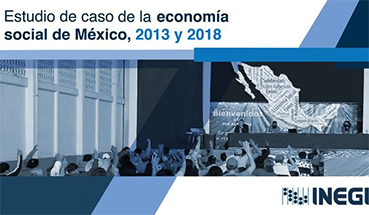By Ivette Ayvar (CIDE) and Roberto Cañedo (CIRIEC Mexico)
On 24 April, the presentation of the Case Study on the Social Economy of Mexico, 2013 and 2018 took place in the framework of the Travelling Seminar ‘Satellite Account of the Social and Solidarity Economy in Ibero-America’, co-organised by the Centro de Investigación de DocenciaS Económicas (CIDE) and CIRIEC-Mexico. The event was attended by the National Institute of Statistics and Geography (INEGI) and the National Institute of Social Economy (INAES), as well as representatives of CIRIEC-Colombia, CIRIEC-Brazil, CIRIEC-Costa Rica and CIRIEC-Spain.
The objective of the study is to provide an overview of the participation of the social economy in Mexico’s Gross Domestic Product (GDP), both in terms of production and employment. The study considered that social economy entities are autonomous organisations and that their members have the dual status of workers and members. These two elements were important topics of discussion at the seminar. The main findings of the study and the methodology used were also presented.
Some of the main results were: for 2018 in Mexico, the GDP of the social economy reached 354,706 million pesos, equivalent to 1.6% of the national GDP. Employed paid jobs in the social economy amounted to 1,751,695, this is equivalent to 4.5 % of the total in the Mexican economy. With regard to the jobs provided by the social economy, we can see that they are made up of: paid employed jobs (workers hired with remuneration) and unpaid employed jobs (partners-workers and their families, whose remuneration for their work corresponds to the profits obtained in the activity).
In 2018, according to functional classification, ejidos contributed 70.7% of the GDP of the social economy. The ejido in Mexico is a system of land distribution and ownership that was institutionalised as a revolutionary agrarian reform, and consists of granting land for use and exploitation to a group of people; it is an example of collective land ownership.
We see that for 2018 and at current prices, 76.5 % of the GDP of the social economy was distributed in primary activities; 16.4 % in financial services; 2.8 % in manufacturing; 1.5 % in trade; 1.5 % in transport and 1.3 % in sectors such as mining and construction. Also, in 2018, measured at 2013 prices, the social economy had an increase of 30.3 % compared to 2013. In the same period, the total economy grew by 13.2%. According to functional classification, for 2018 the GDP of the social economy was made up of the contribution of ejidos, with 70.7 %; followed by savings and loan cooperative societies, with 15.1 %; then come communities, with 4.4 %; next are cooperative societies, with 4.0 %; then rural production societies, with 1.8 % and finally the rest of the organisations, with another 4.0 %.
The methodological and conceptual development of the study was supported by a Multidisciplinary Technical Group (MTG), with the participation of representatives of the Higher Council of Cooperativism (Cosucoop), the Superior Council of Co-operativism of the Mexican Republic (Mexicoop), CIRIEC México, the National Agrarian Registry, the Public Register of Commerce (RPC), INAES and INEGI. The results were obtained based on the international guidelines of the 2008 System of National Accounts (SNA) Manual, jointly prepared by the United Nations (UN), the Statistical Office of the European Commission (EUROSTAT), the International Monetary Fund (IMF), the Organisation for Economic Co-operation and Development (OECD) and the World Bank (WB). The Manual for drawing up satellite accounts of companies in the social economy: co-operatives and mutual societies, prepared by CIRIEC for the European Commission, was also considered. Additional financial support for the study was provided by the International Fund for Agricultural Development (IFAD) through the Economic Commission for Latin America and the Caribbean (ECLAC).
The seminar discussed the need to incorporate other issues, such as women’s unpaid work, social currencies, the informal economy, the expansion of the production frontier for a better accounting of the social economy, among others. In addition, there was a debate on the perimeter of the social economy, on the challenges we still face to continue building increasingly inclusive and accurate mechanisms to measure the scope and contributions of the social economy. Mexico, through INEGI, committed to continue developing materials to guide other countries in the design and implementation of satellite accounts in the social economy for Ibero-America with a high level of reliability and certainty.
Link to view the seminar https://www.youtube.com/watch?v=iCFKd2g8Uqo
Contact for future seminar sessions: Ivette.ayvar@cide.edu







